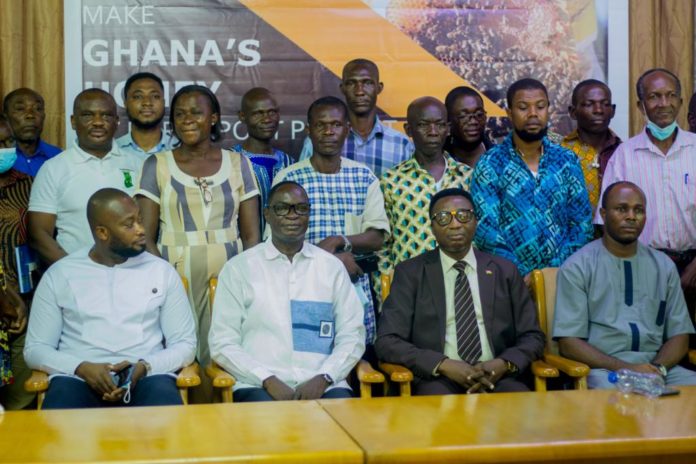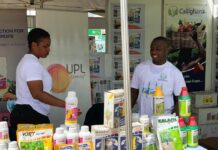It is undeniable fact that honey is one of the demanded commodities on the local and international market which has huge economic benefits. But the question is do beekeepers and honey value chain actors are aware of its health and economic benefits?
As part of the measures to enable honey fit for local consumption and for export, GIZ, QSI, AGRIVIMS, and its supporting partners have organized a stakeholder’s workshop on the theme: “Make Ghana Honey Fit for Local and Export Project”, a kick-off project to boost Ghana’s honey sector.
“Honey is profitable but it is not well structured and developed due to the lack of skills and information about the market”, Prof. Peter Kwapong, the Chairman of the workshop said.
Prof. mentioned that honey is a lucrative business and indubitably it is one of the major products of beekeeping. According to him, the project would provide the needed capacity building to enhance quality honey production for local consumption and export.
“Beekeepers will be equipped with the needed knowledge and skills about beekeeping to boost the quality of honey harvested for local consumption and exporting”, Prof Kwapong added.
He urged the youth to venture into beekeeping to benefit from the great opportunities associated with the sector.
The project will help Ghana to export quality honey to the international market. Even though Ghana has challenges of honey consumption, this project is to support the honey sector with the training of the beekeepers, honey packers, and the value addition on honey for utilization, the Acting Director of CSIR-Food Research Institute, Prof. Charles Tortoe said.
He underscored the need to bring all the stakeholders together to work to achieve the objective of producing quality honey for the local market and international market.
“There are a lot of opportunities in honey in the international market but how to utilize these opportunities has become a challenge and this project would serve as a catalyst to this challenge”, Prof. Tortoe said.
To develop the honey industry to achieve its maximum potential in Ghana, Farmer Anthony Morrison, the CEO of the Chamber of Agribusiness noted a honey policy should be formulated. He mentioned that the honey policy would be an opportunity to give the platform to design the short and medium terms strategy for the development of the industry.
“The whole agriculture industry is not properly harmonized, we have been complaining about non-commitment and non-alignment of government policies however, the only way the private sector can move is when the private sector is able to regulate its own activities and design its investment pathways”, he said.
Globally, the industry is worth about $9 billion dollars and this is a mammoth potential for Ghana and the industry to engage.
He urged the stakeholders to position and harmonize the activities in producing honey to bring credibility to the work and products.
“In a research, I conducted in some part of the country, I realized that our local beekeepers do produce unadulterated honey, the only issue they have is the improper harvest of the honey but with the honey, I purchase from some of our big supermarkets were all adulterated”, Dr. Courage Besah-Adanu, the project coordinator for Make Ghana Honey Fit for Export Project explained.
Dr. Courage mentioned that the beekeepers do not adulterate honey but the those who package the honey and the project is to scale up the analysis to all the regions in the country, build beekeepers’ capacity, scale-up production and give unique identity for producing unadulterated honey for the local and international market.
He called for stakeholders’ cooperation to make the project a success to revamp the dying interest of consuming honey by Ghanaians.
He commended the sponsors and supporting partners for making the workshop a success.








